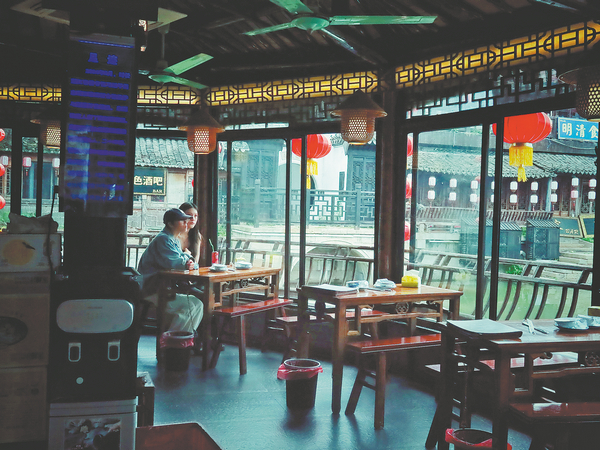

"Their homes have been upgraded to make their lives easier, but the appearance of their houses has largely retained the original features. We want to preserve the traditional landscape, but we also must ensure that people live a convenient life," Han adds.
There are still 2,600 households in the town. "With residents, the town is not just a scenic spot for tourists, but a community for people," says Sun Yuqing, a tour guide in Xitang.
The ancient town is also famous for pankou (literally "coiled buttons"), Chinese knot buttons made from cloth or other fine materials. They are used as fasteners or decorative elements on traditional clothing.
Peng Lihua, an inheritor of button-making, who has been involved in the craft for more than two decades, says that pankou dates back more than a millennium. The knot buttons are entirely made by hand and come in various styles.
In recent years, pankou has enjoyed boom, and has been turned into new items, such as small pieces of jewelry, with earrings, necklaces and brooches made using elements of it. Residents also make paintings with pankou elements, creating a new derivative of the ancient product that can be used as a home furnishing, Peng says.
She says that Dashun village in Xitang is regarded as "the hometown of buttons" since about 40 percent of modern buttons in China are produced there.
The increasing popularity of traditional pankou in recent years is inseparable from the rise in wearing hanfu, or traditional Chinese clothing.
According to Hang Bin, a town official, since 2013 when Taiwan lyricist Vincent Fang started the first hanfu cultural week in Xitang, the annual event, which takes place every October, has attracted more than 1 million visitors.
During the festival, people wearing traditional Chinese clothes get free admission to the town and can take part in activities like re-creations of traditional ceremonies, flower-decorated boat parades and script-based role-playing games.
The cultural week attracts overseas fans as well. Enthusiasts from more than 20 countries and regions, including the Republic of Korea, Malaysia and South Africa, have joined in cultural activities pertaining to hanfu.
"Hanfu is a reflection of traditional Chinese culture. We believe organizing this event is beneficial both for cultural protection and tourist development. As a result, we continue to develop hanfu-making and associated businesses, and the trade has now become prosperous," Hang says.
There are now more than 100 shops offering hanfu and customized makeup styling services to tourists at Xitang as a result, Sun says.
One such boutique was opened by Nabil al-Aghbari, a 58-year-old businessman from Yemen and his wife, Yin Hongxia.
"Eight years ago, I fell in love with Xitang during a visit. It was so beautiful and tranquil, far from the hustle and bustle of cities, and I wanted to be here," says the Yemeni businessman, who was involved in foreign trade in Yiwu, Zhejiang, before settling in Xitang.
As he walked around the town during hanfu cultural week in 2016, he was amazed. "Hanfu dresses are exquisite and match the atmosphere of this old town. As a result, I decided to open a hanfu shop here," he says.
He often shows the clothes to international visitors and helps them try them on. "I hope hanfu culture spreads so that more people will try the clothes. I believe the more traditional it is, the more global appeal it has," he says.
Contact the writer at wangru1@chinadaily.com.cn